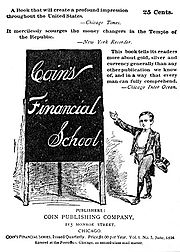
Coin's Financial School
Encyclopedia

Free Silver
Free Silver was an important United States political policy issue in the late 19th century and early 20th century. Its advocates were in favor of an inflationary monetary policy using the "free coinage of silver" as opposed to the less inflationary Gold Standard; its supporters were called...
and populist
Populist Party (United States)
The People's Party, also known as the "Populists", was a short-lived political party in the United States established in 1891. It was most important in 1892-96, then rapidly faded away...
movements. The author of the text "Coin", William Hope Harvey
William Hope Harvey
William Hope "Coin" Harvey was an American teacher, businessman, author, and politician best remembered for his views and his book on bimetallism and the health resort he built in Northwest Arkansas, Monte Ne...
, would later go on to aid William Jennings Bryan
William Jennings Bryan
William Jennings Bryan was an American politician in the late-19th and early-20th centuries. He was a dominant force in the liberal wing of the Democratic Party, standing three times as its candidate for President of the United States...
in his bid for the presidency
Presidency
The word presidency is often used to describe the administration or the executive, the collective administrative and governmental entity that exists around an office of president of a state or nation...
and would run for the presidency himself in the 1930s. The book was remarkably popular in its day, selling an estimated 1 million copies.
The thesis of Coin's Financial School is that London arranged the end of the free coinage of silver in 1873 because they had gold cornered
Cornering the market
In finance, to corner the market is to get sufficient control of a particular stock, commodity, or other asset to allow the price to be manipulated. Another definition: "To have the greatest market share in a particular industry without having a monopoly...
and thus the large Civil War debt became payable in gold
Gold standard
The gold standard is a monetary system in which the standard economic unit of account is a fixed mass of gold. There are distinct kinds of gold standard...
instead of silver. The Coinage Act of 1873 demonetized silver by allowing repayment of all debts in gold or silver at the option of the holder of the debt. The deflation resulting from the immediate removal of a significant portion of the nation's money supply
Money supply
In economics, the money supply or money stock, is the total amount of money available in an economy at a specific time. There are several ways to define "money," but standard measures usually include currency in circulation and demand deposits .Money supply data are recorded and published, usually...
affected agriculture and business severely.
External links
- Original text of Coin's Financial School online
- Scan of Coin's Financial School

